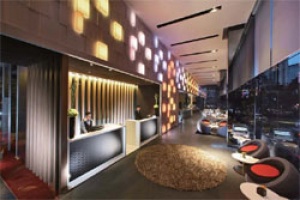European hoteliers on an upward path to recovery

Hoteliers in Europe have seen revenue per available room (revPAR) growth accelerate each month since December last year, with September posting the strongest yet, up 16.8%. This enabled the region to secure a 9.5% revPAR rise year-to-September to €64, compared to €58 during the same period in 2009. Occupancy was the main driver of growth, up 5.6% to 64.2% (60.8% in 2009) while average room rates declined slightly, falling just short of the €100 mark.
Commenting ahead of the Deloitte European Hotel Investment Conference in London on Wednesday, Alex Kyriakidis, Global Managing Partner of Tourism Hospitality & Leisure at Deloitte, said: “The hotel industry has always mirrored the global economy and the past few years have been no different. As economic recovery in the emerging economies accelerates, Europe is growing albeit at a more sedate pace. This trend has also been apparent in the hotel industry, with European revPAR growth lagging recovery in Asia Pacific by 12 months. Although revPAR growth has been accelerating across the region since the end of last year, there is some way to go, with revPAR still €10 short of the levels achieved pre-recession.”
Growth outside the Eurozone (when measured in euro) posted double-digit growth of 11.2% to €65 year-to-September (compared to €58 in 2009). The Eurozone reported somewhat weaker growth, up 7.6% to €62 (€58 in 2009).
Cities in Germany stole the show in terms of performance, with Munich, Dusseldorf and Frankfurt each reporting revPAR growth in excess of 20%. Hoteliers in Germany have benefitted from the biennial trade fair cycle and many will have also seen a boost from the reduction in the rate of VAT on accommodation from the standard rate to 7%, introduced at the beginning of the year.
London hoteliers achieved the highest occupancy in Europe at 82.1% and saw revPAR leap 12.2% to £102 (£91 in 2009). The UK capital not only benefitted from it being a Farnborough Air Show year but also an influx in Arab travellers during the summer in the lead up to Ramadan.
ADVERTISEMENT
In the Turkish capital Istanbul, revPAR grew just short of 10% driven by a 14.0% increase in occupancy to 72.9% (64% in 2009), while average room rates contracted 4% year-to-September. Istanbul has enjoyed renewed interest as a destination as the European Capital of Culture in 2010, in addition to being a reasonably priced alternative for those who generally vacation outside the Eurozone. Despite year-to-September results showing a dip in average room rates, the past four months have actually seen positive growth, and with high occupancy, hoteliers should have a chance to push rates up in the near future.
Looking ahead, Marvin Rust, Hospitality Managing Partner at Deloitte, said: “Despite Europe experiencing a slower recovery than its global rivals, it still has some of the highest volumes of tourist arrivals in the world. It is home to some of the most popular tourist attractions and best-performing hotels. However, austerity measures introduced in many European countries this year continue to threaten travel and hotel demand. Looking ahead into next year, hotel performance should emulate the drawn-out economic recovery expected in most European markets with revPAR continuing on a muted, but upward, path.”
“German hoteliers may struggle in 2011 as the trade fair cycle hits a trough. However some events, including the FIFA Soccer Women’s World Cup and the 200th anniversary of the birth of composer Franz Liszt, may soften the blow. Overtime, we also expect the effect of the VAT cut to reverse. In the UK, the outlook for 2011 will also be challenging when measures announced in the emergency budget and the results of the public spending cuts feed through to the economy and the consumer. Additionally, the relative appreciation of sterling against both the euro and dollar together with the VAT increase will make the UK more expensive for overseas travellers.”
The improvement in performance is being mirrored in the transaction market. Nick van Marken, Global Head of Hotel Advisory at Deloitte, highlighted: “There has been a notable shift in sentiment. At the top-end it is a seller’s market, underpinning the inherent attraction of prime assets in gateway markets. London in particular has seen resurgence in activity, with a host of transactions in 2010. Appetite remains exceptionally strong and we have seen the same in New York and Paris.
“At the opposite end of the scale, the budget hotel market also remains in favour - one only needs to look at the successful sale of various portfolios in the past year. Underpinned by strong performance, this lends further weight to the view that the budget hotel proposition remains compelling to both consumers and investors.”
Van Marken added: “We are confident we will see a number of transactions, notably the return of portfolio deals in the next 12 months.”

